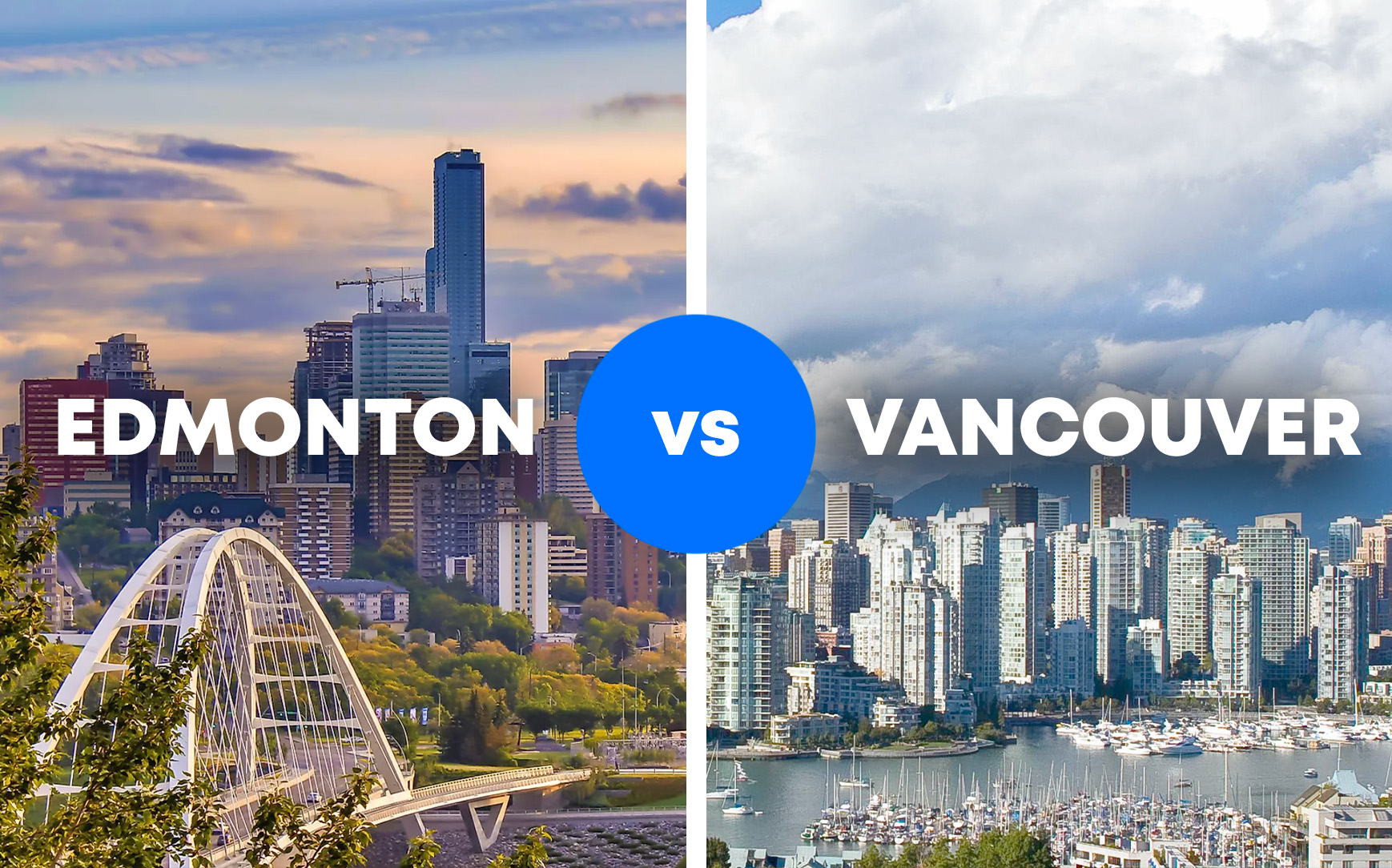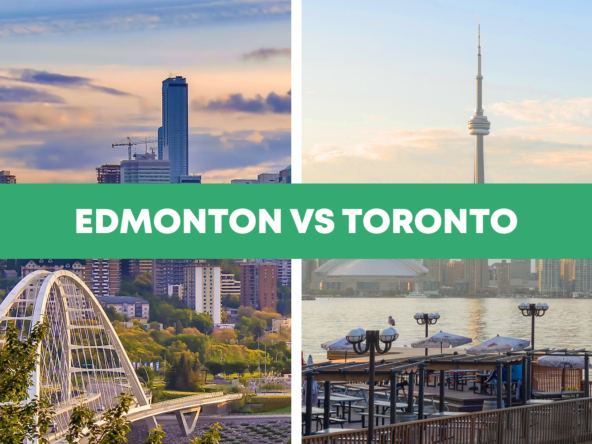Introduction
Understanding the cost of living and housing markets in Edmonton vs Vancouver is crucial for anyone considering relocation, investment, or simply exploring the real estate landscape in these Canadian cities. This article delves into a detailed comparison of living expenses, housing prices, and lifestyle factors in both cities.
Understanding the Cost of Living in Edmonton vs Vancouver
- Edmonton: Known for its affordability, Edmonton offers a cost of living that is 30% less expensive than Vancouver. In terms of global ranking, Edmonton stands at 2214th, making it more budget-friendly than its counterpart.
- Vancouver: Despite its higher living costs, Vancouver remains a popular choice due to its high quality of life. It ranks 2nd in Canada for its costliness, with consumer prices being significantly higher than in Edmonton.
Housing Market Comparison: Edmonton vs Vancouver
- Edmonton’s Housing Market: Offers more affordability with an average house price in the Greater Edmonton Area (GEA) at $390,063, reflecting a stable yet growing demand for housing.
- Vancouver’s Housing Market: Famous for being one of Canada’s most expensive, with the average house price in Greater Vancouver at $1,267,057. The demand for housing here is high, driven by limited supply and strict zoning regulations.
Job Opportunities and Salary Comparisons
- While the average monthly net salary after tax is slightly higher in Vancouver than in Edmonton, the local purchasing power is 25% lower in Vancouver compared to Edmonton.
Analyzing Utility Costs and Living Expenses
- Utilities: Edmonton residents pay more for basic utilities for an apartment than those in Vancouver. However, mobile phone plans and internet costs are slightly cheaper in Vancouver.
- Transportation: Edmonton’s public transport is generally more expensive, but taxi services and gasoline are cheaper compared to Vancouver.
Climate and Lifestyle: Edmonton vs Vancouver
- Edmonton: Known for its colder climate and vibrant cultural scene, it offers a different lifestyle compared to Vancouver.
- Vancouver: Favored for its milder climate and natural beauty, it’s a hub for outdoor activities and has a thriving economy and cultural diversity.
Making the Move: Considerations for Relocation
- When considering relocation, it’s important to weigh the cost of living, housing affordability, job opportunities, and lifestyle preferences. While Edmonton offers affordability, Vancouver appeals with its lifestyle and economic opportunities.
Understanding the Cost of Living in Edmonton vs Vancouver
In 2023, the cost of living in Edmonton vs Vancouver presents a clear contrast, with Edmonton being the more budget-friendly option. Let’s delve into a detailed comparison of everyday living costs in both cities:
| Expense Category | Edmonton (CAD) | Vancouver (CAD) |
|---|---|---|
| Monthly Cost for One Person | $1,764 | $2,515 |
| Monthly Cost for a Family | $3,943 | $5,763 |
| Monthly Rent (1 Bedroom, City Centre) | $885 | $1,773 |
| Monthly Rent (3 Bedrooms, City Centre) | $1,513 | $3,326 |
| Utilities (1 Person) | $148 | $76.7 |
| Internet (50 Mbps, Unlimited) | $64.6 | $62 |
| Public Transport Ticket | $2.53 | $2.33 |
| Monthly Public Transport Pass | $74.9 | $101 |
| Meal (Inexpensive Restaurant) | $16.1 | $16.5 |
| Cappuccino | $3.78 | $3.97 |
| Basic Groceries (Milk, Bread, Rice, etc.) | $27.56 | $35.8 |
| Gym Membership (1 Month) | $42.5 | $40 |
| Cinema Ticket (1 Person) | $11.5 | $13 |
| Doctor’s Visit | $61 | $113 |
| Average Monthly Salary (After Tax) | $2,971 | $3,235 |
This table provides a snapshot of the differences in everyday expenses between the two cities. Edmonton’s lower cost of living is evident in most categories, particularly in housing and utilities. However, Vancouver offers slightly higher salaries, which partially compensates for its higher living costs.
Housing Market Comparison: Edmonton vs Vancouver
In 2023, the housing markets in Edmonton vs Vancouver present a stark contrast, primarily in terms of pricing and market conditions.
Vancouver’s Housing Market:
- Pricing and Demand: Vancouver is known for having one of the most expensive housing markets in Canada. Despite high prices, the demand remains strong due to limited supply and high quality of life. In March 2023, Greater Vancouver’s average house price was $1,267,057, with detached homes, attached houses, and apartments averaging $2,168,938, $1,198,837, and $786,362 respectively.
- Market Trends: The median price in Metro Vancouver was $1,143,900, marking a 1.8% monthly gain and a 9.5% year-over-year fall. Benchmark prices for detached homes declined year on year but showed a monthly increase, reflecting the city’s dynamic and high-priced market.
Edmonton’s Housing Market:
- Affordability and Stability: Edmonton’s market is more affordable and less competitive. The availability of land and a simpler approval process for developments contribute to its stability. In March 2023, the average house sold price in the Greater Edmonton Area was $390,063, with condo units averaging $192,746.
- Price Trends: Edmonton’s housing prices are generally lower across all types of properties. For example, the benchmark price for single-family detached homes was $429.5k, a 7.7% yearly decline. Townhouses and condo flats also showed similar trends of affordability compared to Vancouver.
The choice between these two markets depends on individual preferences and priorities. Edmonton offers more affordable housing options, making it attractive for those seeking budget-friendly living. On the other hand, Vancouver, despite its higher costs, remains a desirable location due to its quality of life and economic opportunities.
Job Opportunities and Salary Comparisons: Edmonton vs. Vancouver
Edmonton’s Job Market and Opportunities
- Current Employment Trends: As of November 2023, Edmonton’s unemployment rate stands at 6.2%, which is a slight increase from the previous month but still below the long-run average. This indicates a reasonably stable job market, recovering from its peak unemployment rate of 9.4% in June 2020.
- High Demand Jobs: Edmonton’s job market forecasts indicate labour shortages in several key areas by 2030, particularly in construction, recreation and sport, landscaping, and healthcare. High demand jobs for 2023 include Registered Nurses, Software Developers, Electricians, Welders, and Mechanical Engineers, highlighting the city’s diverse employment opportunities.
- Industries with Growth Potential: The technology, healthcare, renewable energy, environmental sustainability, and fintech sectors show significant growth potential in 2023, offering robust job opportunities, especially for new graduates.
Salary Trends in Edmonton
- Average Salary: The average salary in Edmonton varies across sources, indicating a range between C$51,963 to C$100,629 annually. This variance reflects differences in job roles, industries, and individual qualifications.
Vancouver’s Job Market and Opportunities
- Employment Trends: Vancouver’s unemployment rate as of November 2023 is 5.8%, showing stability and a recovery from a peak of 7.7% in June 2020. The city also witnessed a rise in part-time positions.
- Projected Job Openings: Between 2023 and 2033, B.C. is expected to have about one million job openings, driven by both economic growth and the need to replace workers retiring from the labour force.
- Key Industries: Vancouver boasts diverse economic sectors, including clean technology, digital entertainment, film and TV production, green building design, local food, technology, VFX & animation, and virtual reality. These industries offer varied and dynamic career opportunities.
Salary Trends in Vancouver
- Average and Median Salaries: The average yearly salary in Vancouver is around CAD 129,000, with a median salary of CAD 113,000. This indicates a higher earning potential in Vancouver compared to Edmonton.
- Influence of Experience and Education: Salary in Vancouver is strongly influenced by experience and educational qualifications. For example, professionals with more than five years of experience earn significantly more than entry-level workers. Similarly, higher educational attainment correlates with higher income levels.
Comparative Analysis
Comparing Edmonton vs Vancouver, it’s evident that both cities offer diverse job opportunities but with distinct focal industries and salary scales. Edmonton’s job market is buoyed by its demand in healthcare, technology, and trade sectors, while Vancouver thrives with its strong film, technology, and green economy sectors.
Salary-wise, Vancouver generally offers higher average and median salaries, influenced greatly by experience and education. This could be attributed to Vancouver’s higher cost of living and the nature of its key industries. Edmonton, while having a slightly higher unemployment rate, presents a varied job market with opportunities across different sectors.
For individuals considering a move, these factors play a crucial role in deciding which city aligns better with their career aspirations and lifestyle preferences. The higher salaries in Vancouver might be attractive, but they come with a higher cost of living. Edmonton’s job market, while diverse, might offer lower average salaries but also has a comparatively lower cost of living.
Climate and Lifestyle: Edmonton vs Vancouver
Edmonton’s Climate
- General Climate: Edmonton experiences a humid continental climate, characterized by comfortable summers with long sunny days and short nights, and typically cold, dry winters.
- Temperature Extremes: Average daily temperatures in Edmonton range from a low of -10.4 °C in January to a summer peak of 23 °C in July. The city can experience temperature extremes, with highs exceeding 30.0 °C in summer and lows falling below -20.0 °C in winter.
- Precipitation: Edmonton has a fairly dry climate, with an average annual precipitation of 476.9 millimeters, which includes both rain and snowfall. The city receives the heaviest rainfall in late spring, summer, and early autumn, with July being the wettest month.
Vancouver’s Climate
- General Climate: Vancouver has a moderate oceanic climate that borders on a warm-summer Mediterranean climate. Summers are typically dry, often resulting in moderate drought conditions, while the rest of the year, especially from October to March, is rainy.
- Temperature Variability: The coastal location of Vancouver, tempered by the North Pacific Current, leads to milder temperatures. The city experiences microclimates with local variations in weather, sometimes more exaggerated than in other coastal areas.
- Winter and Spring Characteristics: Winters in Vancouver are typically mild with infrequent snowfall, allowing many cold-hardy flowers to remain in bloom. Spring often arrives early, noticeable in February with milder temperatures and the return of flowering perennials.
- Summer Temperature Variations: The Greater Vancouver region experiences significant variations in summer temperatures, which can differ markedly between inland areas and the ocean-tempered coastal regions.
Lifestyle Implications
The climates of Edmonton vs Vancouver significantly influence the lifestyle and living conditions in each city. In Edmonton, residents experience a more pronounced seasonal change, with cold, dry winters and comfortable summers, requiring different lifestyle adaptations throughout the year. The relatively dry climate could be preferable for those who enjoy sunny days and less humidity.
In contrast, Vancouver’s milder, oceanic climate offers a consistently temperate environment, with cooler winters and dry summers. This climate supports a diverse range of outdoor activities year-round and is ideal for those who prefer a milder, more stable climate with less extreme temperature variations.
In choosing between Edmonton vs Vancouver, potential residents should consider not only job opportunities and cost of living but also the climate and how it aligns with their lifestyle preferences. The distinct climates of these cities contribute significantly to the overall living experience and should be a crucial factor in any relocation decision.
Exploring the Cost of Living in Edmonton vs Vancouver
Moving to a new city is a significant decision influenced by various factors, including lifestyle, cost of living, and personal preferences. Here’s a comparative look at some key considerations for relocating to Edmonton or Vancouver.
Edmonton: A Vibrant and Affordable Choice
- Proximity to Nature and Outdoor Activities: Edmonton is known for its close proximity to the Rocky Mountains, offering abundant opportunities for outdoor activities in all seasons.
- Healthcare: The city is renowned for its excellent public healthcare system, with several top-rated hospitals and upcoming new healthcare facilities.
- Cultural Life: As “Canada’s Festival City,” Edmonton hosts numerous festivals that celebrate its multiculturalism, adding to the city’s vibrant cultural life.
- Transportation: Edmonton’s transit system, including the Light Rail Transit (LRT), is efficient and being expanded, enhancing connectivity across the city.
- Education: The city boasts a wide range of educational institutions, including the University of Alberta, catering to diverse educational needs.
- Climate: Edmonton experiences a range of weather conditions, with cold winters and a significant amount of snow, influencing lifestyle choices and necessitating appropriate clothing and accessories.
- Housing Affordability: The cost of housing in Edmonton is relatively affordable, with the average sale price of a single-family home being significantly lower than in major cities like Vancouver or Toronto.
Vancouver: A Multicultural Hub with Natural Beauty
- Natural Beauty and Outdoor Opportunities: Vancouver’s stunning scenery, including mountains and the ocean, offers a plethora of outdoor activities and access to world-class hiking and skiing destinations.
- Cost of Living: The cost of living in Vancouver is high, with considerable expenses for housing, utilities, and general living costs.
- Job Market: The city’s job market is diverse, with opportunities in various industries like film, technology, and natural resources. Over one million new jobs are expected by 2031.
- Lifestyle and Entertainment: Vancouver’s lifestyle is iconic, offering a diverse and vibrant food culture, thriving arts, and a rich tapestry of communities.
- Climate: Vancouver enjoys a mild climate with relatively mild winters and a dry summer season, making it ideal for year-round outdoor activities.
- Transportation: Traffic can be challenging, but Vancouver boasts excellent public transportation services, including the SkyTrain and SeaBus, as well as extensive bike lanes for cyclists.
Conclusion: Edmonton vs. Vancouver
Choosing between Edmonton vs Vancouver depends on personal preferences and priorities. Edmonton offers a more affordable cost of living, a vibrant cultural life, and proximity to outdoor activities, making it ideal for those seeking a balance between urban living and nature. In contrast, Vancouver’s natural beauty, milder climate, and diverse job opportunities appeal to those who prefer a more temperate environment and a dynamic urban lifestyle. Both cities offer excellent healthcare, education, and transportation systems, contributing to a high quality of life. The decision ultimately hinges on individual preferences regarding climate, lifestyle, and economic opportunities.
Q: What factors should I consider when comparing the cost of living between Edmonton vs Vancouver?
A: When comparing the cost of living between Edmonton vs Vancouver, you should consider factors such as housing prices, utilities, transportation costs, and overall standard of living expenses.
Q: How do the housing prices in Edmonton vs Vancouver compare?
A: The housing prices in Vancouver are generally higher than those in Edmonton. Vancouver is known for being one of the most expensive cities in Canada in terms of real estate, while Edmonton tends to have more affordable housing options.
Q: Are there any recent comparisons of the cost of living between Edmonton vs Vancouver?
A: Yes, there are recent comparisons available that provide insights into the cost of living differences between Edmonton vs Vancouver. You can find updated information on the latest living expenses, rent prices, and overall cost comparisons online.
Q: How do the climates in Edmonton vs Vancouver differ?
A: The climate in Edmonton is known for its colder winters and warmer summers, while Vancouver has a milder climate with more rainfall. Consider the climate difference when making a decision about which city to move to, as it can impact your lifestyle and preferences.
Q: What are some moving companies that can help with relocating to Edmonton or Vancouver?
A: There are several moving companies that can assist with your relocation to either Edmonton or Vancouver. Some reputable movers include [Mover Company A], [Mover Company B], and [Mover Company C]. Be sure to compare their services and prices before making a decision.
Q: Is Vancouver more expensive than Edmonton in terms of the overall cost of living?
A: Yes, Vancouver is generally considered to be more expensive than Edmonton in terms of the overall cost of living. This includes higher housing prices, utility costs, and overall expenses compared to Edmonton.
Q: How does the standard of living in Vancouver compare to that of Edmonton?
A: Vancouver is known for offering a higher standard of living compared to Edmonton, but this comes with a higher cost. Consider your budget and personal preferences when deciding between the two cities.
Q: Are there any specific insights into the full price comparison of living in Edmonton versus Vancouver?
A: Yes, there are detailed full price comparisons available that provide a comprehensive overview of the living expenses, rental costs, and overall spending between Edmonton vs Vancouver. You can find in-depth analysis and comparisons to help make an informed decision.
Q: What are some major differences in the cost of living between Vancouver and Edmonton?
A: Some major differences in the cost of living between Vancouver and Edmonton include housing affordability, transportation costs, and overall expenses. Vancouver is generally more expensive in these areas compared to Edmonton.
Q: How do the prices and comparisons of Edmonton vs Vancouver compare in 2022?
A: In 2022, the prices and comparisons between Edmonton vs Vancouver continue to show a notable contrast in living expenses. Stay updated on the latest data and insights to help with your decision-making process.





